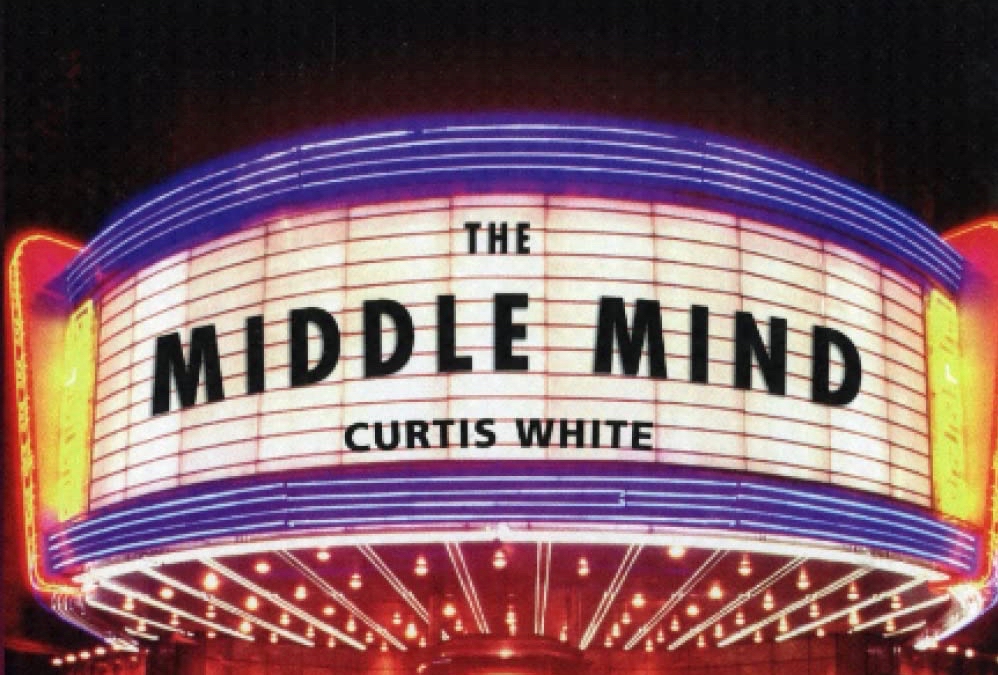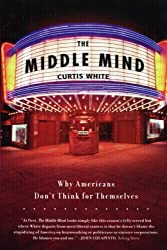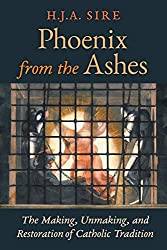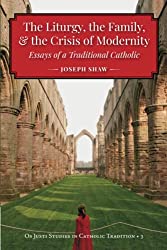
Recently I have been re-reading a book by Curtis White, who is a penetrating thinker, though hardly a Christian one.
The book is called: The Middle Mind: Why Americans Don’t Think for Themselves.
White is a university professor and like myself, is an American, and what he means by The Middle Mind is the generation of a collective mindset – generated across the board: in the media, in academia, in political pronouncements, in entertainment, in the arts so-called.
It is a mindset whose effect is to dull thinking, numb feeling and to admit no world, beyond the borders of a tightly controlled domain.
Everything from Steven Spielberg films to liberal college education is analysed – acutely – in this book. What White is doing – among other things – is to show how apparently disparate institutions now tend to the same end. How for example, once “high brow” academia and “low brow” crass entertainment now amount to the same vision.
As the author writes:
The American university is not itself part of the Middle Mind, whose realm strictly speaking is entertainment, but it is a mostly unwitting ally [It] shares … the tendency to flatten distinctions.
This is most conspicuous in what has become known as “Cultural Studies”, where notoriously Milton has had to share the stage with Madonna for the last two decades. [There is] a flattening effect on literature, because all texts can be said to contain “signifiers” acting as “social symptoms” … A TV commercial, a sitcom, a tabloid treatment of OJ, a poem by Yeats – they’re all “manifestations of culture”.
This tends to flatten culture, abolish distinction, make everything gray.
White frequently does superb work I think, to show how this Middle Mind is so very effective – effective in reducing, confusing, blurring and simplifying issues, leading to a culture of banal mediocrity.
It is also a culture that stultifies what White calls the imagination. The word as White uses it, points to something incredibly potent and multilayered. But it includes – though is not limited to – our ability to conceive of any other cultural option or future for humanity.
Moreover the author also possesses the courage to link our cultural deficit of imagination to a political agenda – one of stupefying people and producing tolerance to what ought to be intolerable.
Thus he writes that it serves capitalism and a corporate culture that does not want us to think of any world beyond its own agendas. As White puts it: ‘The Middle Mind is a strategy. It is a means to an end. It is a form of management.”
And I feel like adding: Here is the true opium of the people.
For all his shrewd insight in these areas, I want to salute Curtis White.
I regret to say that I find the book less-than-satisfactory in other respects, however.
White is an entertaining, very funny writer. But I wonder if he is too funny – a writer who cannot resist a (good) joke. I freely admit it: I laugh when he writes lines like the following about the recurrent use of the American flag in Spielberg’s Saving Private Ryan:
Is the flag present in the movie because, well, flags are always in WWII movies? Is it a purely generic concession? That would be really stupid, if that’s the case.
White’s punchline: “It therefore very possibly is the case.”
I laugh . . . but should I be weeping more?
Because White is really talking about something that is not for laughs. It is something that is murdering the soul of our civilisation.
Some will consider this book as just another liberal rant. It is certainly true that White belongs to liberal, leftist American academia. He is however acutely aware of the poverty of vision of his vague, liberally minded cohort – as well as its poverty of commitment to change.
Indeed he despairs of much hope for change. Yet ironically to my own Catholic mind, his despair may well be rooted in his own incapacity to see much beyond the contemporary culture that we are locked in.
Here is the irony I at least, cannot help but see in The Middle Mind: The thesis here is that we are locked into a tight, narrow culture, yet the Catholic of Faith will be unable to escape the conclusion: White himself is locked into the selfsame culture – and its byproducts – that he criticises …
Once more, the author is not a Christian thinker. And he often takes a dim view of Christianity in these pages. Like so many Americans, his dominant associations around Christianity are to do with the Protestant Evangelism – which has served to convince so many Americans that Protestant Evangelism is pretty much all there is to Christianity.
To his credit, White does recognise that there are other versions of Christianity. In an effort to be fair, he gives fleeting mention to “the Christianities of Dante, or Chaucer or Gerald Manley Hopkins” as being different to the Christianity, which he critiques. Yet it is not surprising that what he does not mention, is that all three of these men were Catholics. More on this point, in a moment …
On the whole, the book is anti-traditional religion. Still White does seem interested in something, which he calls “religion”.
Yet to the Catholic mind, it amounts to a highly minimalist version of religion.
True religion for White would seem to involve the capacity to be consciously reflective, to feel passionately and to engage the imagination.
Of course, I agree with White on all of this. True religion does involve all these things. But it also involves far, far more. My beef with White’s “religion” is that it is so terribly minimalist. For White, it would appear, this is what true religion is – and not much else.
Thus I doubt whether it occurs to White that the reason there might be Catholic geniuses like Dante is not simply that they possessed vivid insight or imagination – but also that they were nourished by the living SACRAMENTS.
I may be wrong, but I tend to doubt whether an appreciation of a Sacrament has ever even entered into White’s stripped-down reading of religion …
Really White’s take on what religion amounts to is not far different from many of the more intelligent New Age approaches – minus some wackiness (That of Richard Moss springs to mind here). From a Catholic hermeneutic, it is reductionist, humanistic and in the end materialistic.
Once in a while, I even find the book odious. There is an all-too-casual purely utilitarian defense of killing the unborn to save the born …
Some may wonder why I bother at all with Curtis White. First, I believe in reading and absorbing many different sides of important issues.
And the issues here are very, very, very important.
We are being murdered -I want to repeat – by the very things White is talking about. And whatever the book’s numerous faults, it contains a truly sharp analysis of both how and why we are being murdered.
Christianity is also being murdered by the same forces that White analyses. The Christian and Catholic Faith is being buried by the kind of Middle Mind that White so ably describes here …
A wag once said: it is a difficult acrobatic feat to place a laurel leaf on someone’s head, while giving him a boot up the rear at the same time.
.
There is a paradox for me here – White is describing in very acute terms indeed a culture that is stultifying, becoming ever more mercilessly automatic and robotic.
What White is describing tunnel vision – yet his remedies stem from the very same tunnel that led to the problem. At least, I do not think a truly Catholic mind can escape any other conclusion.
A truly Catholic mind cannot help but see the author as locked into the materialistic tunnel of the last centuries that counts supernatural grace or the Sacraments for nothing, nothing at all. All the author can do is dream of a culture in which by our own effort, we will become once again reflective, imaginative, critical, feeling …
I wonder if the Professor here has ever bothered to take seriously a critique, from beyond this perspective …
Such a critique would say. The so-called progressive, liberal trajectory of the last centuries, is at least open to serious critique. There may be something in the “premodern view” that human beings are not free from Original Sin and will not – in and of themselves – automatically move ever forward into greater freedom and creativity.
Of this your penetrating book, Dr White, may I say offers all-too-ample evidence?
And what if Dr White, the only answer is not an answer that simply involves human effort – greater imagination, critical thinking and the like – but Supernatural Grace?
And what if the Sacraments of the Church confer that Grace, but that you – like so many millions of other good, decent people – have been deprived by the self-same secular tunnel, from knowing what a Sacrament even is …?
Of course, Dr White, I imagine you dismiss all of this out of hand. And you do not engage much with what the geniuses of the West – beyond the last centuries or so, pre- Locke, pre-Hume – were really concerned with.
But if I am right, your non-engagement is my point, really.
Still I could recommend your book to many people.
Because once again, we are being murdered, slowly murdered. And The Middle Mind could serve as a wake-up call from an author whose mind and heart are clearly ALIVE – whatever his culturally prescribed reductions of religion, amongst other important things.
Foreword for Monarchy by Roger Buck
Buying Books at Amazon Through These Links Gives Us a Commission. This Supports Our Apostolate. Thank You if You Can Help Us Like This!









Comments
comments are currently closed
7 responses to “The Middle Mind: Why Americans Don’t Think for Themselves—Curtis White (Review)”
[…] I have said (for example in my review of the leftish The Middle Mind: Why Americans Don’t Think for Themselves ) I believe in reading widely across a spectrum, from left to right, from academic to popular to […]
Here’s a quote from Middle Mind: “The Middle Mind is pragmatic, plainspoken, populist, contemptuous of the right’s narrowness and incredulous before the left’s convultions. It is adventuresome, eclectic, spiritual, and in general agreement with liberal political assumptions about race, gender, and class.”
Publishers have a habit of making titles more provocative than the content of the book. Not having read the book, I can’t say whether this is the case here. There is a seeming contradiction between this definition of the Middle Mind and the subtitle “Why Americans Don’t Think for Themselves.” Those words, without going deeply into them, have to do with choosing: eclectic for style, adventure perhaps for lifestyle, spiritual to maximize choice in terms of religious life loosely defined. Conspicuously, the middle mind has not chosen a side politically, being unconvinced if only because the conduct of both sides is suspect.
There is thinking going on. It is the conclusions drawn and the process of thought that that are disagreed with.
To then conclude that there must be a reason there is no thought, when that is a faulty premise, doesn’t do much to validate the rest of the book. Maybe that isn’t what the author does. Maybe instead he makes a plea to abandon ways of thinking that lead to bad results, maybe even show us how we can enter into bad habits or at least how we might cultivate good habits.
Quite apart from all that, what I have wanted to say about this book. America is a feeling. Bono said that America is more than a nation, it’s an idea. Wholeheartedly agree. But it is also a feeling. Much of the time, our interpretation of the idea, our feelings generally align and we can compromise. When our interpretations, our feeling diverge, we begin to attribute bad motives to those on the other team, feel that any who do not agree are, at best, not thinking at all.
Thank you warmly for taking time to comment, Billy.
This blogging can be a lonely business and such thoughtful responses are deeply appreciated.
You raise different things and I’ll try to respond to several – starting with your last thoughts regarding America.
You made me wonder if the book’s subtitle is unfortunate. It perhaps seems to indicate simply an attack on America …
Let me say that I think the author is identifying a problem that is far wider than America itself and is possibly disserved by this subtitle.
Because I also take your point when you write:
“Publishers have a habit of making titles more provocative than the content of the book. … There is a seeming contradiction between this definition of the Middle Mind and the subtitle “Why Americans Don’t Think for Themselves.”
Yes in order to get himself into print, the author may have succumbed to the very thing he criticises. If I recall rightly, in his next book he speaks of prostituting himself, though regarding it a necessary evil …
I will just say that while my concerns about America might suggest otherwise at times, I have resonance with what you write as to America being an idea, a feeling …
America has a SOUL and there is great nobility within that soul.
It does seem to me that that soul is – at the present time – afflicted by the kinds of problems Curtis White is pinpointing. But so are other Western cultures, too. Singling out America for blame and casting stones will not help.
As to your point regarding White arguing with conclusions, I think there is truth here too.
And of course some kind of thinking, some kind of thought process is going on within what White calls The Middle Mind.
How rigorous that thinking is, how self-reflective, how sharp those thought processses are is another matter entirely.
As my review indicates, I think the thought-processes which White is pinpointing are very often fuzzy, shallow, facile – and I honestly believe dangerous. As I said, I don’t think White has gone far enough in either naming or feeling the danger.
But in saying this I don’t want to criticize America.
What I want to do really, is be a Christian.
To be a Christian it seems to me is to take evil seriously.
It is to believe in a Prince of Darkness and demons. Those demons are at work continuously in our world and their efforts are not limited to the most egregious of domains: drug addiction, terrorism, whatever.
The darkness is very interested in working itself into all domains and in generating sloppy, unconscious thought processes.
Of course with his materialistic hermeneutic, Curtis White would find the last notion ridiculous: the idea that Satan and his minions had much to do with The Middle Mind.
A lot of people in the modern matrix will find that ridiculous of course.
But as a Christian, I feel called ever more deeply to take evil seriously …
Finally Billy I have registered your concern with polarisation here, as when you write:
“we begin to attribute bad motives to those on the other team”
This is a very real danger, of course.
It seems to me that we need to be humble. Evil is at work everywhere – including in the darkness of my own heart. If I can remember the darkness in my heart – not easy! – I won’t slip into casually blaming others.
At the same time, I will aspire to remain existentially awake – as befits a Christian – to the powers of darkness working in all of us.
Again, thank you most warmly.
Dear Roger: I just came across your commentary on my 2003 book The Middle Mind. I just wanted to thank you for the fairness and seriousness of your criticism. I think it’s true that I didn’t quite come to taking the role of spirit seriously in that book. While I may never join you in the Catholic Church’s analysis of evil, in subsequent books–The Spirit of Disobedience and The Barbaric Heart–I make strong efforts to capture the importance of the spiritual. The Spirit of Disobedience takes a Christian standpoint very seriously. I even think that I quote from a Papal encyclical on the culture of life, although I can’t seem to locate it. My own Christian tradition is mostly the existentialists beginning with Kierkegaard and going to Tillich. Ultimately, though, I am a Buddhistic soul. New Agey, perhaps, from your perspective. Anyway, I’d be honored to send you copies of the two books if you’d like them. CW
Curtis – May I ask you a question? Was the title and subtitle to Middle Mind yours or your publishers? Perhaps there’s story behind it? I’m genuinely curious and not looking to pick a fight with you on Roger’s fine blog.
Billy, that’s a very good question with a very revealing answer. You are not the first to notice that the subtitle, in particular, has almost nothing to do with the book. Marketing at Harper Colllins wanted a good subtitle and mine were, I confess, terrible. When I saw this one I said, “Brilliant. Misleading, but brilliant.” They just wanted to sell books.
I was content with the main title but that too was dictated to me. All the blog and media hoopla about the original essay in Harpers was associated with that title. They wanted to take advantage of the branding that had already happened. My feeling was that they owned the cover and I owned the inside. Frankly, they didn’t care what was in the inside. The notoriety of the book and its publishing success was all about the scandal of me saying wicked and true things about Terry Gross. Period. But I tried very hard to make something authentic out of the opportunity.
Still, revealing.
[…] and peruse her extensive library of hypnosis cds for hypnosis empowerment. The Link Between NLP and Hypnosis Article by Roseanna Leaton …nguistic Programming (NLP) to the other and was very enthusiastically mentioning the ways in which […]